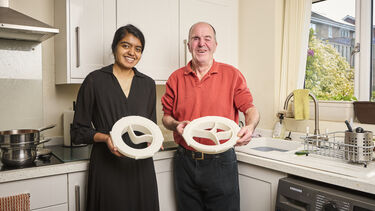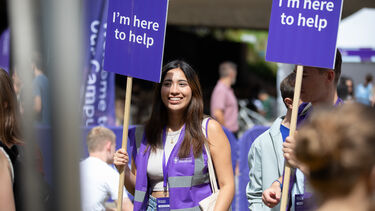- Blind Sheffield chef Frank, passionate about cooking but challenged by presentation, sought a solution to his problem through the 9 1√‚∑—∞Êœ¬ of Sheffield's Hackcessible ‚Äòmake-a-thon‚Äô initiative.
- A team of multidisciplinary students devised, designed and 3D-printed a removable plate organiser with tactile features and braille markings, enabling Frank to plate his dishes safely and aesthetically.
- The project was a winning entry in Hackcessible 2025, providing valuable real-world experience for the students and enhancing Frank's enjoyment of cooking and entertaining.
A passionate amateur chef who‚Äôs been blind since the age of 21 is finally able to present his dishes in style thanks to the ingenuity and innovation of a team of 9 1√‚∑—∞Êœ¬ of Sheffield students.
Frank Gardener, 62, from Sheffield, lost his sight as a young man after undergoing 30 unsuccessful operations to tackle his deteriorating eyesight as a result of a condition called Treacher-Collins syndrome. Determined not to let his disability define him, Frank learnt braille and other skills and went on to have a successful career as a gardener before moving to Sheffield and spending 20 years with the civil service.
Now retired, Frank turned his attention to his passion for cooking and entertaining guests. While Frank is more than capable of cooking and serving food, he’s always found plating it in an aesthetically pleasing way a challenge.
Through local charity the Sheffield Royal Society for the Blind, Frank put forward a problem to a 9 1√‚∑—∞Êœ¬ of Sheffield initiative called . The ‚Äòmake-a-thon‚Äô competition invites overlooked problems from the region‚Äôs disabled community and matches them with teams of students to collaborate on workable solutions that support their needs.
James Midmer, an international student studying Mechanical Engineering at the 9 1√‚∑—∞Êœ¬ of Sheffield, led the multidisciplinary team working with Frank to solve his problem.
“We all got to meet Frank, his wife Nicky and their two guide dogs who were so warm and welcoming,” said James.
“We were able to talk to him and really understand the challenges he was facing, from plating food, getting portion sizes correct and knowing what goes where on a plate; something so many of us take for granted.”
Initially the team brainstormed high-tech solutions, but working with Frank and understanding his needs showed them that simplicity was key. Their idea, an organiser with several sections that can be placed on top of any plate when plating food and then removed before serving to guests, was a hit. While plates with separate sections, similar to those in a school dining room, are readily available and functional, they lack the visual appeal Frank was hoping for who wants his guests to have the same experience they would have anywhere else.
Using state-of-the-art 9 1√‚∑—∞Êœ¬ facilities at the Digital Innovation Zone, the team devised and developed a prototype plate divider and 3D printed it at the student-led makerspace, . With the addition of textured exteriors to denote size, sloped outer rings to provide a tactile guide for food placement and braille markings on the rim to differentiate between sections, their creation was complete.
“I really love to cook. We have a lot of dinner parties and enjoy entertaining guests - but I do get hung up on the presentation,” said Frank
“Getting food from the pan to the plate can be difficult and there’s also portion sizes and the fact that some people like their meat or fish and types of veg to be separate, not all intermingled.
“When I heard about Hackcessible, it seemed like a fantastic opportunity to try and solve the problem I and many others face. I was very impressed with the students’ approach, considering every aspect of the problem. I was also gobsmacked by how clever they all are at such a young age.”
The plate dividers, which come in several sizes, are a well-used and welcome addition to Frank’s kitchen. The team even adapted serving spoons, attaching raised stickers to the handles, to differentiate sizes to help Frank serve soup.
“I’m really chuffed with the result. Thanks is not a big enough word to express my gratitude,” Frank continued.
“It’s been a fantastic experience meeting and working with the students and I’ve enjoyed every minute of it.”
James and the team were awarded first place in Hackcessible 2025 for their creativity and ingenuity. Joining James in the team were Bioengineering students Anna Court, Janvi Ranish and Stenee Stanly, Computer Systems Engineering student Archie Rogers, and Mechatronic Engineering students Ionnis Kosmanis and John Vergara.
“To me it was never about winning the competition, it was about helping Frank,” said James.
“We were over the moon with how it all went. If it ends just with Frank being able to do what he needs to do, we’ll all be very happy.”
As well as solving Frank's problem, the students gained valuable real-world experience in project management, presentation skills and more.
“It’s one of the reasons I decided to come to Sheffield,” James added.
“It’s got the best co-curricular activities on top of a really good course - a match made in heaven!”
While they may have solved Frank’s problem, the journey doesn’t end there. With many potential use cases for the plate dividers, from opening up opportunities for visually impaired and blind people in the culinary industry to being used as an educational tool, there's more to come from the team.
Their project is one of many ingenious assistive solutions Sheffield students devised for Hackcessible 2025. From a walker tailored to a young adult to affordable technology for those who struggle with speech, users' needs were at the heart of every project. The competition also provided students with the chance to put theory into practice and develop key skills to boost employability.
Dr Pete Mylon, a Senior 9 1√‚∑—∞Êœ¬ Teacher and founder of Hackcessible, said: ‚ÄúIt‚Äôs always great to see the innovative solutions students come up with and to witness them collaborating with disabled challengers. This has been our most successful year in terms of the number of functioning solutions, with five teams producing fully working prototypes that are already benefitting their users.‚Äù
Jane Peach, Marketing Manager at Sheffield Royal Society for the Blind, said: "We work with lots of students when they are studying in Sheffield (from both Universities) and love to get involved with a wide range of projects, as we know that when students pursue their chosen careers they will remember what they learnt from our clients and our charity, therefore helping to raise awareness of vision impairment and wider issues around accessibility.
“It's been great to hear about the ideas generated for the Hackcessible project by their multidisciplinary teams, who listened to input from our clients about their lived experiences and the challenges they face, then working together to find lots of amazing solutions. We were delighted to hear Frank's project had won!”




